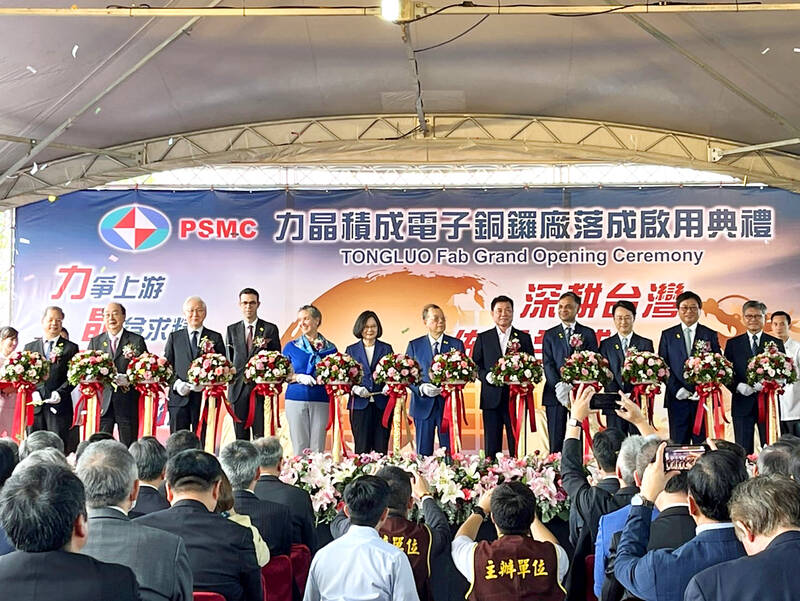Contract chipmaker Powerchip Semiconductor Manufacturing Corp (力積電子) yesterday launched a new 12-inch fab, tapping into advanced chip-on-wafer-on-substrate (CoWoS) packaging technology to support rising demand for artificial intelligence (AI) devices.
Powerchip is to offer interposers, one of three parts in CoWoS packaging technology, with shipments scheduled for the second half of this year, Powerchip chairman Frank Huang (黃崇仁) told reporters on the sidelines of a fab inauguration ceremony in the Tongluo Science Park (銅鑼科學園區) in Miaoli County yesterday.
“We are working with customers to supply CoWoS-related business, utilizing part of this new fab’s capacity,” Huang said, adding that Powerchip intended to bridge the supply gap left by Taiwan Semiconductor Manufacturing Co (TSMC, 台積電). “Our products are in the process of verification.”

Photo: Grace Hung, Taipei Times
TSMC has said it plans to more than double its CoWoS capacity by the end of this year, which is still not able to meet customers’ AI demand. An insufficient supply of interposers is considered the bottleneck of TSMC’s CoWoS packaging solutions for Nvidia Corp’s AI chips.
Powerchip last month raised its capital spending by 28 percent for this year to NT$32 billion (US$984.7 million), from a previous estimate of NT$25 billion, as it plans to add manufacturing capacity for CoWoS and wafer-on-wafer packaging technologies.
The company’s new Tongluo fab, dubbed P5 fab, is to utilize 55-nanometer, 40-nanometer and 28-nanometer technologies to make OLED panel driver ICs and Wi-Fi chips initially, in addition to AI-related products.
Powerchip has invested about NT$80 billion in the new fab facilities and manufacturing equipment with an initial capacity of 50,000 12-inch wafers per month, it said.
The chipmaker plans to add another 50,000 12-inch wafers in capacity and upgrade to 22-nanometer technology based on its second-phase development plan, it said. Total investment in the fab would cost NT$300 billion, it added.
“The launch of the Tongluo fab comes at a time when the world’s integrated device manufacturers and chip designers are reconfiguring production resilience amid geopolitical conflicts,” Huang said. “This fab will satisfy major customers’ needs for building a resilient supply chain outside China. Not to mention the booming demand for AI-related applications.”
The new fab would significantly boost the company’s revenue, he said.
With AI enabling more applications and user cases, the Taiwanese semiconductor industry would play a more essential role in the world’s rapidly changing industrial environment, President Tsai Ing-wen (蔡英文) said at the opening ceremony.
Tsai attended the ground-breaking ceremony of the fab three years ago.
The semiconductor industry is a key driving force for the nation’s economy and industrial innovation, Tsai said. Last year, Taiwan’s semiconductor companies generated NT$4.3 trillion in production value, with more than 250,000 participants in the industry, she said.
Powerchip reported a fourth-straight quarterly loss for last quarter of NT$439 million. That was an improvement from losses of NT$2.11 billion in the final quarter of last year, it said, adding that it expects the quarterly losses to shrink further for the rest of the year.

Semiconductor business between Taiwan and the US is a “win-win” model for both sides given the high level of complementarity, the government said yesterday responding to tariff threats from US President Donald Trump. Home to the world’s largest contract chipmaker, Taiwan Semiconductor Manufacturing Co (TSMC, 台積電), Taiwan is a key link in the global technology supply chain for companies such as Apple Inc and Nvidia Corp. Trump said on Monday he plans to impose tariffs on imported chips, pharmaceuticals and steel in an effort to get the producers to make them in the US. “Taiwan and the US semiconductor and other technology industries

SMALL AND EFFICIENT: The Chinese AI app’s initial success has spurred worries in the US that its tech giants’ massive AI spending needs re-evaluation, a market strategist said Chinese artificial intelligence (AI) start-up DeepSeek’s (深度求索) eponymous AI assistant rocketed to the top of Apple Inc’s iPhone download charts, stirring doubts in Silicon Valley about the strength of the US’ technological dominance. The app’s underlying AI model is widely seen as competitive with OpenAI and Meta Platforms Inc’s latest. Its claim that it cost much less to train and develop triggered share moves across Asia’s supply chain. Chinese tech firms linked to DeepSeek, such as Iflytek Co (科大訊飛), surged yesterday, while chipmaking tool makers like Advantest Corp slumped on the potential threat to demand for Nvidia Corp’s AI accelerators. US stock

The US Federal Reserve is expected to announce a pause in rate cuts on Wednesday, as policymakers look to continue tackling inflation under close and vocal scrutiny from US President Donald Trump. The Fed cut its key lending rate by a full percentage point in the final four months of last year and indicated it would move more cautiously going forward amid an uptick in inflation away from its long-term target of 2 percent. “I think they will do nothing, and I think they should do nothing,” Federal Reserve Bank of St Louis former president Jim Bullard said. “I think the

SUBSIDIES: The nominee for commerce secretary indicated the Trump administration wants to put its stamp on the plan, but not unravel it entirely US President Donald Trump’s pick to lead the agency in charge of a US$52 billion semiconductor subsidy program declined to give it unqualified support, raising questions about the disbursement of funds to companies like Intel Corp and Taiwan Semiconductor Manufacturing Co (台積電). “I can’t say that I can honor something I haven’t read,” Howard Lutnick, Trump’s nominee for commerce secretary, said of the binding CHIPS and Science Act awards in a confirmation hearing on Wednesday. “To the extent monies have been disbursed, I would commit to rigorously enforcing documents that have been signed by those companies to make sure we get